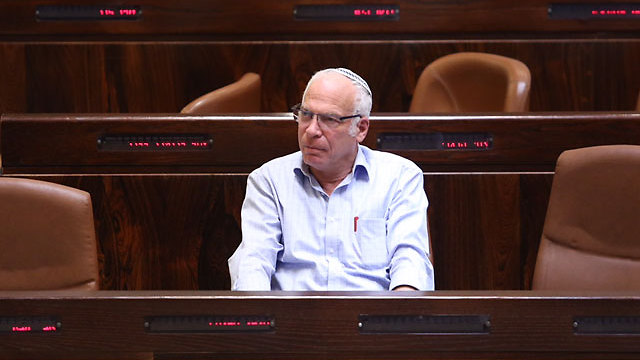
EU ambassador to Israel, Lars Faaborg-Andersen
Photo: Yossi Zwecker
The EU decision on Wednesday to label products from Israeli settlements in the West Bank, Golan Heights and East Jerusalem, has led to a series of retaliatory moves from Israel.
Interview with Austria's Ambassador to Israel Martin Weiss (צילום: ליאור פז אבי חי אורי דוידוביץ')
President Reuven Rivlin canceled his planned visit to the European Union headquarters in Brussels, which was scheduled for December 2.
Rivlin, who was invited back in March, was supposed to speak in front of the EU parliament and meet with EU officials.
The President's Residence confirmed the trip had been postponed, but would not address the reasons behind the decision.
The EU's Ambassador to Israel, Lars Faaborg-Andersen, was summoned to the Foreign Ministry, where he was informed Israel was suspending diplomatic dialogue in several important European forums.
Prime Minister Benjamin Netanyahu called the decision "hypocritical" and "a double standard."
"The European Union should be ashamed," Netanyahu said in a video statement in English.
"The European Union has decided to label only Israel, and we are not prepared to accept the fact that Europe is labeling the side that is being attacked by terrorism," he added.
Minister of Immigrant Absorption Ze'ev Elkin was blunter, calling the decision "anti-Semitic and outrageous," while Minister Ofir Akunis said he "scorns the decision, which constitutes a moral stain on Europe."
Agriculture Minister Uri Ariel, meanwhile, traded his Citroën vehicle, which is manufactured in Europe, with a Japanese Mazda.
The guidelines approved by the EU executive on Wednesday mean Israeli producers must explicitly label farm goods and cosmetics that come from settlements when they are sold in the European Union. The EU guidelines aren't expected to necessarily apply to Israeli industrial or electronic products, or to non-fresh foods.
The EU does not recognize the legitimacy of Israel's presence in the West Bank, East Jerusalem and the Golan Heights, territories captured by Israel in the 1967 Six-Day War. As such, goods from there cannot be labeled "Made in Israel" and should be labeled as coming from settlements, which the EU considers illegal under international law.
EU officials defending the decision said the labeling "will give consumers the option of making a conscious decision whether to buy the product or not."
The damage to the Israeli economy is estimated at only $10 million a year, out of $300 million of export from factories in the settlements.
"The Israeli economy is strong and will withstand this," Netanyahu said. "Those who will be hurt will be those Palestinians who work in Israeli factories."
Currently, some 15,000 Palestinian workers are employed in Israeli factories in the West Bank and make up about 60 percent of the work force. If the factories lose money because of the European move, some of these workers could find themselves out of a job.
Two international law experts, Prof. Avi Bell and Prof. Eugene Kontorovich, published a legal opinion that determines the labeling of products is a violation of international trade laws, and that Israel could challenge the decision in the appropriate forums.
Itamar Eichner, Eldad Beck, Gad Lior, Elisha Ben-Kimoon, Amihai Attali, and Elior Levy contributed to this report.


















